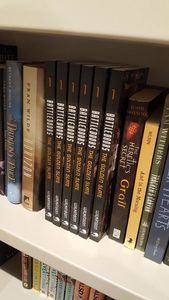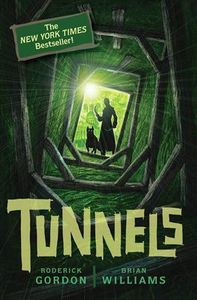The Persistence Needed to Publish
By Brian Wilkinson
In my first post I talked about finding the motivation to write. The second post was about having the patience needed to get through the writing process. If you managed all of that and are now thinking about publishing (if you haven’t already) then you need yet another quality to make it through: persistence.
It’s an incredible feeling to hold your book in your hands for the first time. It’s strange to see it on book shelves and stranger still, when it’s your first book, to add the title of ‘author’ to whatever resume you’ve been building for yourself in your life thus far. But I won’t lie, it’s a painful process to get to this point and most people either stumble here or bail entirely. I can’t really blame them, either. I faced more than seven years of rejections before I finally got the thumbs up.
So what is it that gets you through all of those years? Well, all you need to do is take a look at history. The Beatles were famously rejected many times. J.K. Rowling was turned down at least a dozen. Stephen King was about to pack it in as well and his wife fished Carrie out of a trash can. Many other authors, far better than I am, aren’t so lucky.
What is it that separates the two groups? Often, it’s timing. Maybe the submissions editor on duty that day is in a bad mood. Or the person who normally loves your type of book is on vacation and someone else is filling in. Or maybe they just put out a book just like yours and are looking for something different. None of that is your fault, so you need to find the ability to ignore all the bad bits and keep going at it anyway. Again and again. It probably wouldn’t hurt to buy horseshoes if you can.
Persistence is the key. Let’s start the hypothetical but unfortunately likely rejection process together, shall we? The process begins in a fairly straightforward manner. You have a manuscript and want to get it published. Most publishers have a submission page on their website that shows the basic requirements. This is where some people balk a little. The most common requests are for the first three chapters, a synopsis, a brief bio of the author, and a cover letter. That you have to mail in. Don’t forget to add in return postage to get it back. All of that is a lot for someone who just wrote a book and may not be prepared to package it up to try and sell it. Even once you do all of that the worst part is you have to wait about three months for the rejection to roll in.
Does it seem like I’m being pessimistic? I’m not, I promise you. That’s key, actually. The rejection part. Just expect it and you won’t be disappointed. Take in the feedback you might get, good or bad, and ignore the form letters. Form letters just mean they likely didn’t even read it. Don’t take them personally. Most publishers receive a ton of manuscripts each week. Even if they love it, most don’t have the money needed to back every project that comes across the desk. Many can’t even afford the salary it would take to hire people on full time just to look at submissions. They do the best they can when they can. You think all those publishers wanted to miss out on Harry Potter? No way. They just couldn’t find the needle in the haystack. Publishers are people too. They have families, hobbies, and the need to sleep just like everyone else.
All you can control is how you handle things from your end. You need to be organized. I kept a spreadsheet of the places I had applied to, when, and what the resulting response was. This had a couple of difference effects on me. One, it kept my ego in check and my expectations low. It also motivated me to keep trying. Even now, had things not gone my way, I’d still be doing it. What does it cost you beyond the money you need to mail it? This way, you can still enjoy the fact that you wrote something that has some meaning and have the satisfaction of knowing you’re giving it your all. Getting published at this point honestly didn’t matter so much to me because I never saw the effort of trying to succeed as failure. I’d only be disappointed in myself if I had stopped sending the things out.
While a serious person, no matter how persistent they are, may want to try forever to get published they may reach a point where they feel it’s not going to happen. And maybe it isn’t. Maybe you’ve hit up every publisher at every level and nothing has come of it. Again, don’t let this invalidate you or even stop you. Self-publishing is more common than ever and there are a ton of success stories in this market. Look at The Martian, which went on to become a film that won Best Comedy (don’t get me started). Fifty Shades of Grey is another example. A YA series that I love, Tunnels, also comes from this category. I was about to go in this direction myself before I got picked up.
Before rejecting this suggestion out of hand, and most people do as there is a stigma associated with self-publishing, I’d ask you to refer back to my first post on motivation for a moment. Why did you want to write this book in the first place? Was it for success, fame, glory, and millions of dollars? If so, you might want to re-evaluate all of that. For new authors, there is no real money and no real glory, for the most part, so go into the whole thing with reasonable expectations and try to enjoy the process for what it is. If success comes, that’s wonderful, but the real success is that you made it this far to begin with. That doesn’t happen for everyone, regardless of talent, and so make sure to be grateful. Show extra gratitude to your publisher, as well, for taking a chance on you. They didn’t have to and they risk a lot more than you do (THANK YOU, BLUE MOON, A MILLION TIMES OVER, FOR WHAT YOU HAVE DONE FOR ME AND MY FAMILY!).
If you want to stick it out in the traditional path, then pack a tent, a walking stick, and extra rations, and set out with the mindset of someone with no particular destination. Eventually, I hope, you’ll find what you’re looking for. Once you’re accepted (and a HUGE congrats if you do, I know it’s not easy), then the book you wrote… the art you created… is out there in the real world. That means more work, reviews, appearances, and more. I’ll talk more about that next time.
Until you get to that point, however, do whatever you can to share your art with the world and be content with whatever level of success it attains. Be persistent, don’t lose heart, and you’ll never be disappointed.
Your CanLit News
Subscribe to Open Book’s newsletter to get local book events, literary content, writing tips, and more in your inbox
The views expressed in the Writer-in-Residence blogs are those held by the authors and do not necessarily reflect the views of Open Book.
Brian Wilkinson attempts to juggle multiple careers as an author, high school teacher, and librarian. He currently lives in East York, Ontario, with his wife and two children, who served as the inspiration for the main characters in his first novels, Battledoors and Paramnesia. Brian was born and raised in Guelph, Ontario, where he attended the University of Guelph and received a BA in English Literature. He continued his writing career by earning a diploma in Journalism from Humber College, and applied those skills by working as a reporter for the Toronto Sun, the Toronto Star, and EYE Weekly, as well as serving as a co-publisher for the comic news site ComiXfan, and an editor for Humber Etcetera, where he won a Columbia Scholastic writing award for first-person column-writing. He was even lucky enough to realize a lifelong dream by writing for Marvel Comics when he co-wrote X-Men: The 198 Files. Brian feels like he is the luckiest person on Earth. He gets to be a dad, a husband, a teacher, and a writer. Not too bad, huh?




